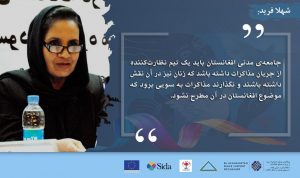Disagreement Among the Afghan Negotiating Team Members Will Hamper Peace Talks.

Experts believe that the Afghan negotiating team capacity to engage in a dialogue with the Taliban is one of the main factors for their success.
Shahla Farid, a law professor at Kabul University who was previously a member of the peace negotiating team, said that the government had not paid enough attention to strengthening the negotiating team’s capacity, only individual attempts have been made by the members themselves. She believes that there is no consensus among the team members which is very crucial in the peace talks.
CSHRN: Has there been any change in the Taliban’s view?
Farid: Looking at their current activities, it can be said that there has been no change in the Taliban’s view, but the result will be determined during the talks.
Ms. Farid adds that the Taliban’s war strategy and their political leaders need to be observed separately to see whether the Taliban political group involved in the negotiations will influence the group’s war machine.
CSHRN: Do you mean that the Taliban who are negotiating with the government are different from the Taliban on the battlefield?
Farid: Although the Taliban who negotiate with the government are less violent, I do not think the two Taliban groups are different during the talks; Because there is one thing in common between the two groups that both see their existence in war and want to prove their reality through war.
CSHRN: If the government share power with the Taliban, what will change in the lives of women?
Farid: If power is shared with the Taliban, they will necessarily protect women’s rights. They cannot close schools and universities and will have to respect many other values. But if they rise to power, the situation of women will change.
CSHRN: What will these changes be?
Farid: I think there will be a relatively long break in women’s social and political participation; this is because the Taliban have conditioned women’s access to their rights based on a proper working and educational environment, and creating such conditions requires time, and the Taliban will not be able to immediately replace their preferred environments with shared work and study spaces.
According to Mrs. Farid, if the Taliban come to power, the war will not end and will continue under different names. She added that the Taliban must change the misconception that they can only gain political power through war; because it is also possible through reconciliation.
Ms. Farid believes that, although the mere presence of the Taliban in government does not mean a lack of social security for women, the issue of women should be an important part of peace talks and efforts should be made to change the Taliban’s view of women.